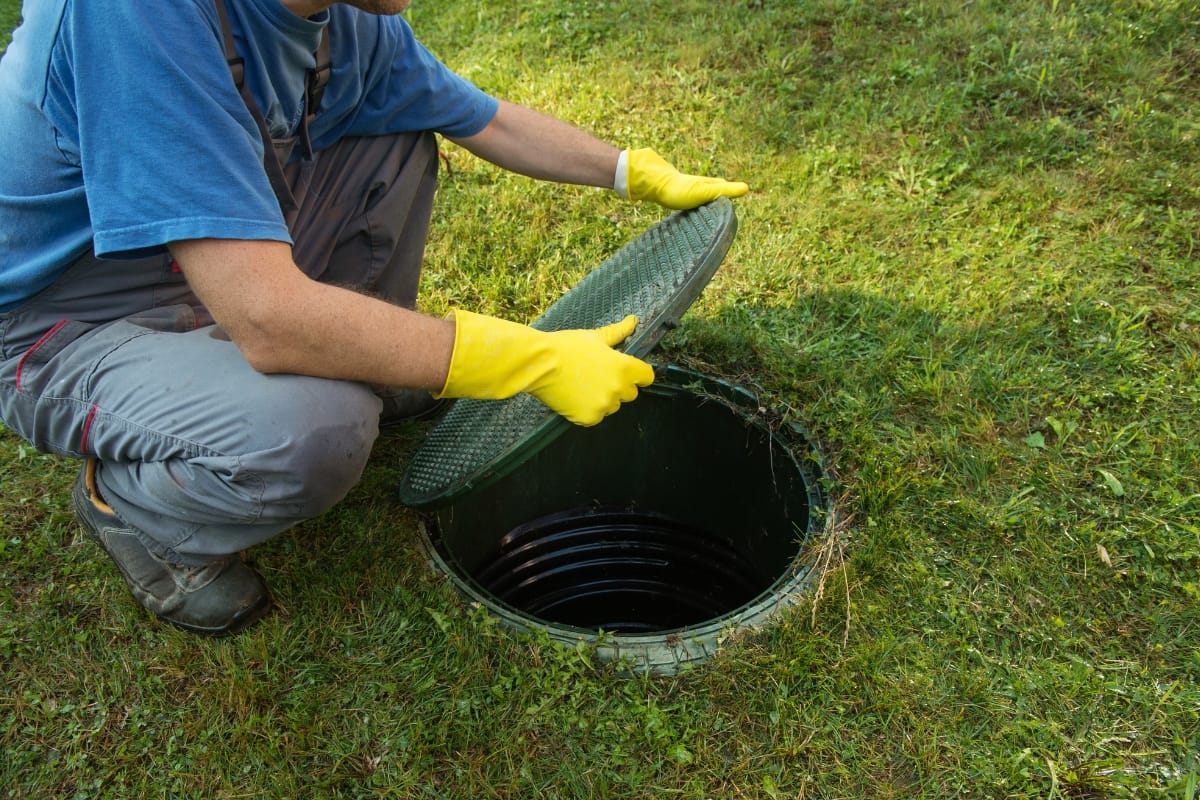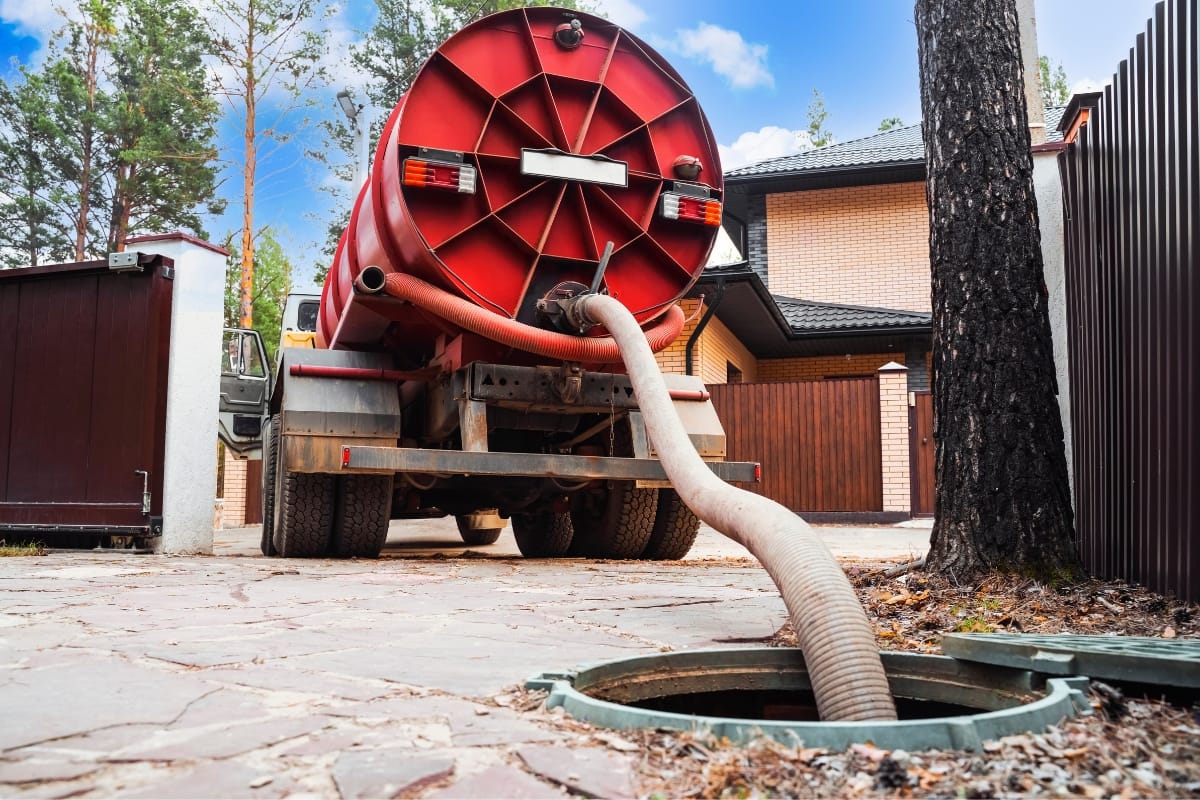For businesses that rely on septic systems, understanding commercial septic tank regulations is crucial to maintaining compliance, ensuring system efficiency, and protecting the environment.
Unlike residential systems, commercial septic systems must adhere to stricter standards due to the higher volume of wastewater and potential environmental impact. This guide will walk you through the essential commercial septic tank regulations, covering key areas like permitting, inspection requirements, waste capacity guidelines, and environmental safeguards.
Whether you’re a business owner, property manager, or contractor, gaining a clear understanding of these regulations will help you avoid costly fines, maintain smooth operations, and promote sustainable wastewater practices.
The Essentials of Commercial Septic Tank Regulations for Your Business
Navigating Key Septic Tank Regulations for Businesses

Understanding commercial septic tank regulations is crucial for businesses aiming to protect the environment and minimize risks associated with wastewater management. Staying aware of regulatory updates helps businesses respond promptly to changes in laws, reducing the risk of costly fines and inspections down the line septic tank maintenance.
Identifying Federal, State, and Local Regulations
Businesses need to familiarize themselves with federal, state, and local regulations governing septic systems.
The Clean Water Act plays a significant role in regulating how human waste and septic tank installation septic tank maintenance are managed to prevent contamination of properties and water sources.
By staying updated on these regulations, businesses can ensure proper waste disposal practices septic drain fields and protect the environment.
Understanding the Role of EPA in Septic Regulations
The EPA plays a vital role in overseeing septic regulations that help manage septic tank installation and protect groundwater.
Businesses must understand that compliance with these regulations not only promotes environmental health but can also impact employment within the community. Violating these rules may result in hefty fees and the necessity for contracts to rectify any septic drain fields issues that arise from non-compliance.
Complying With State-Specific Septic System Standards
Each state has its own standards for septic tank installation systems that businesses must comply with, ensuring their operations meet local environmental quality requirements.
These standards often involve certifications that prove systems are built and maintained to specific guidelines. Regular septic tank maintenance evaluations help businesses maintain compliance, avoiding complaints that can arise from negligence.
- Understand your state’s septic system standards.
- Obtain necessary certifications for compliance.
- Implement regular evaluations of the septic system.
- Address any complaints promptly to maintain good standing.
State regulations can also require businesses to have a vehicle specifically designed for the transportation and disposal of septic tank maintenance waste, further emphasizing the importance of adhering to these guidelines.
The Importance of Local Health Department Approvals
Local health department approvals are critical for businesses to ensure proper sanitation practices. These departments assess how septic systems interact with various factors like irrigation and stormwater management.
By obtaining these approvals, businesses can effectively prevent issues related to septic tank installation or septic drain fields buildup that might compromise their garbage disposal unit functionality and overall environmental health.
Meeting Requirements for Special Business Zones
In special business zones, compliance with septic regulations often involves specific requirements tailored to the nature of the waste produced. For instance, establishments like restaurants may need to install a grease trap to manage fats, oils, and grease effectively, ensuring safe waste management practices.
Additionally, businesses must keep an eye on any tax implications arising from waste disposal services, as these can vary based on the guidelines set forth by both local authorities and entities like the United States Department of Agriculture.
| Requirement | Description |
|---|---|
| Grease Trap Installation | Necessary for managing waste in food-related businesses |
| Pumping Schedule | Regularly pump out septic and grease trap systems to avoid backups |
| Tax Compliance | Understand and comply with tax regulations related to waste disposal |
| Local Regulations Adherence | Meeting specific local regulatory standards for septic systems |
Staying Updated With Changes in Regulations
Businesses must stay informed about changes in commercial septic tank regulations to effectively manage their waste systems. Regulations can evolve to address new findings regarding bacteria and pathogens impacting soil and public health.
Consulting with a health professional regularly can help businesses navigate these updates and ensure their septic systems are functioning properly, preventing contamination of drains and surrounding areas.
Understanding these regulations is just the beginning. Let’s dive into the essential steps needed to ensure compliance and keep your business running smoothly!
Ensuring Compliance With Commercial Septic Tank Regulations

Understanding the key steps to ensure compliance with commercial septic tank regulations helps businesses avoid hazards and protect public health.
Conducting a Site Evaluation Before Installation
Conducting a site evaluation before installation of a septic system is essential for businesses. This process helps identify any potential odor issues and evaluates existing infrastructure, ensuring proper placement and functionality.
Businesses must also check local ordinances to confirm compliance, which may include considerations like the proximity of an injection well or other waste disposal systems important for maintaining their business license.
| Evaluation Aspect | Details |
|---|---|
| Odor Control | Assess potential odor issues in the surrounding area. |
| Infrastructure Assessment | Evaluate the integrity of existing infrastructure to support the septic system. |
| Local Ordinance Compliance | Check local rules and regulations regarding septic systems in the area. |
| Injection Well Consideration | Ensure distance requirements from injection wells are met. |
Choosing the Right Type of Septic System for Your Business
Choosing the right type of septic system is crucial for managing sewage treatment effectively. Businesses must consider how their chosen system will handle wastewater and the impact it has on local water resources.
By selecting a system designed to reduce nitrogen levels, they can minimize environmental damage while ensuring efficient wastewater treatment.
Regular Inspection and Maintenance Schedules
Regular inspection and maintenance schedules are vital for keeping septic systems running smoothly. These practices help ensure that organisms within the system remain balanced, which is crucial for effective waste decomposition.
Additionally, staying proactive with maintenance can prevent issues related to flooding and excessive flow through sand filters, supporting overall sustainability.
| Maintenance Task | Frequency | Description |
|---|---|---|
| System Inspection | Yearly | Evaluate the septic components to ensure proper operation. |
| Pumping | Every 3-5 years | Remove sludge and scum buildup as needed. |
| Filter Cleaning | Yearly | Clean the sand filter to maintain flow and efficiency. |
| Record Keeping | Ongoing | Document inspections, maintenance, and repairs. |
Reporting and Documentation for Compliance
Keeping accurate reporting and documentation is key for businesses managing septic systems. This not only includes tracking biosolids disposal but also the maintenance and inspection records that demonstrate compliance with local regulations.
Proper documentation showcases a commitment to environmental health and ensures a business maintains its license while prioritizing the safety of drinking water and surrounding ecosystems throughout construction projects.
Handling Non-Compliance and Violations Effectively
When a business encounters non-compliance issues related to septic systems, swift action is necessary to mitigate risks.
Addressing violations immediately, especially those that could lead to pollution of surface water or result from leaking tanks, is key to preventing harmful liquid waste from contaminating local waterways.
Engaging Professional Services for Compliance Support
Engaging professional services for compliance support offers businesses the expertise needed to navigate complex septic regulations effectively. By working with experienced providers, businesses can ensure they meet all necessary regulations while prioritizing public health and environmental justice.
- Understanding the importance of public health in septic management.
- Staying compliant with local and federal regulation requirements.
- Utilizing experts to ensure environmental justice in septic practices.
Navigating commercial septic tank regulations can be a complex journey for many businesses. Let’s take a closer look at the common challenges they face along the way.
Common Challenges in Meeting Commercial Septic Tank Regulations

Businesses often face various challenges when navigating commercial septic tank regulations, especially concerning effluent management. Recognizing these challenges is the first step toward finding effective solutions that safeguard both the water supply and the environment.
Navigating Complex Permit Processes
Navigating the permit processes for septic systems can be tricky for businesses, especially in sectors like agriculture. Each application often requires detailed documentation, site assessments, and a clear demonstration of how the system will protect the environment.
Businesses must understand local regulations fully, as any missteps can lead to delays and complications that impact their operations.
Overcoming Limitations of Existing Land Use
Many businesses encounter challenges due to the limitations of existing land use when trying to comply with septic regulations. These constraints can hinder expansion or upgrades, often leaving business owners feeling stuck.
To tackle these issues, it’s crucial for businesses to consult with regulatory agencies and local experts to explore potential alternatives or modifications that may allow for effective septic solutions without infringing on current land use restrictions.
Managing Costs of Compliance and Upgrades
Managing costs related to septic tank compliance can be a challenge for many businesses. Expenses can quickly add up, especially when faced with regulatory updates, system upgrades, and regular maintenance requirements.
Keeping track of these costs and planning for unforeseen expenses helps businesses maintain their septic systems efficiently while remaining compliant.
Staying organized with anticipated costs can significantly reduce the financial burden. This approach allows businesses to allocate resources wisely and avoid disruptions to their operations.
Here’s a table to help illustrate typical expenses that businesses might encounter while ensuring compliance and necessary upgrades:
| Cost Category | Description |
|---|---|
| Initial Setup | Costs for installation and permits of the septic system. |
| Regular Maintenance | Routine expenses for inspections and pumping services. |
| Upgrades | Investments in new technology or systems to meet regulations. |
| Compliance Fines | Potential fees for failing to meet regulations on time. |
Dealing With Non-Standard Waste From Business Operations
Businesses that generate non-standard waste often face additional hurdles when it comes to septic compliance. These unique waste types require specialized treatment solutions to ensure they are managed properly and don’t pose environmental risks.
Understanding the specific regulations for this kind of waste is crucial, as non-compliance can lead to costly fines and potentially harmful consequences for both the business and the community.
Retrofitting Septic Systems for Business Expansion
As businesses grow, retrofitting septic systems becomes essential to accommodate increased wastewater demands.
Upgrading existing systems ensures that they function efficiently while adhering to regulatory standards. This process often involves evaluating current capabilities and determining the necessary modifications to support future expansion.
| Task | Description |
|---|---|
| Assessment of Current System | Evaluate the existing septic system’s capacity and performance. |
| Design Modifications | Plan necessary upgrades to meet new flow requirements. |
| Permitting | Obtain any needed permits for retrofitting work. |
| Installation and Upgrades | Implement the updated septic modifications. |
Businesses face real consequences when they cut corners with commercial septic tank regulations. Ignoring compliance can lead to significant financial and operational setbacks that no one wants to deal with.
Understanding the Impact of Non-Compliance on Businesses

Non-compliance with commercial septic tank regulations can lead to serious consequences for businesses. Addressing these issues promptly is vital to maintaining sustainable operations and fostering a positive environment for both business and community alike.
Legal Repercussions and Penalties for Non-Compliance
Non-compliance with commercial septic tank regulations can lead to severe legal consequences for businesses. Violations often result in hefty fines, which can strain financial operations and lead to increased scrutiny from regulatory agencies.
This situation not only impacts finances but can also escalate into lawsuits or even jeopardize a company’s ability to operate legally within its jurisdiction.
Environmental and Public Health Risks
Failure to comply with commercial septic tank regulations poses significant environmental and public health risks. Contaminants from improperly managed waste can seep into local water supplies, threatening both agricultural and drinking water sources.
This situation can lead to outbreaks of waterborne diseases and harm local ecosystems, demonstrating the need for strict adherence to septic system guidelines.
Addressing non-compliance proactively helps to mitigate these risks and supports a healthier community. Reputable septic service providers can assist businesses in maintaining compliance to safeguard environmental integrity.
Staying informed about best practices in waste management is essential for avoiding contamination and surrounding health hazards:
| Risk Type | Impact |
|---|---|
| Water Contamination | Leads to unsafe drinking water and potential health risks. |
| Ecosystem Damage | Disruption of local flora and fauna due to pollutants. |
| Public Health Concerns | Increased illness due to exposure to untreated waste. |
Financial Burden of Non-Compliance on Businesses
The financial burden of non-compliance can hit businesses hard, affecting their bottom line significantly. Companies may face hefty fines and penalties that can drain budgets and impede day-to-day operations. Beyond immediate costs, businesses risk escalating expenses related to remediation efforts, which often require substantial investments to rectify any compliance issues that arise.
Reputation Damage and Loss of Business License
When businesses face non-compliance issues with septic regulations, reputation can take a serious hit. The community’s trust may erode as concerns about environmental responsibility and safety arise, potentially deterring customers and clients alike.
A tarnished reputation doesn’t just affect daily operations; it can also jeopardize a company’s business license. Regulatory bodies may choose to suspend or revoke licenses in response to repeated violations, leaving businesses unable to operate legally, which can have devastating consequences.
| Impact | Description |
|---|---|
| Loss of Customer Trust | Non-compliance leads to public skepticism about environmental practices. |
| License Revocation | Serious violations can result in losing the right to operate. |
| Negative Publicity | Increased scrutiny and media coverage of compliance failures. |
The Long-Term Costs of Remediation and Repair
Long-term costs associated with septic tank remediation and repair can accumulate quickly for businesses. When issues arise, businesses often face expenses for professional inspections, repairs, and system upgrades. These ongoing costs not only hit financials hard but can also disrupt daily operations, especially when repairs take time, leading to potential loss of revenue.
| Type of Cost | Description |
|---|---|
| Inspection Fees | Costs incurred for professional evaluations of the septic system’s condition. |
| Repair Expenses | Payments for fixing leaks and other system malfunctions. |
| System Upgrades | Investments for upgrading the septic system to meet compliance standards. |
| Operational Downtime | Potential loss of income due to system failures and repair processes. |
Non-compliance can lead to serious setbacks for businesses, making it clear that staying ahead of regulations is crucial. Fortunately, regular inspections and maintenance serve as key tools to ensure compliance and keep operations running smoothly.
The Role of Inspections and Maintenance in Regulatory Compliance

Maintaining compliance with commercial septic tank regulations hinges largely on a proactive approach to inspections and maintenance. Upgrading outdated systems to align with current requirements not only maintains compliance but also enhances operational efficiency, protecting both public health and business reputation.
Scheduling Regular Septic System Inspections
Scheduling regular septic system pumping and inspections is vital for any business relying on wastewater management. These inspections not only help identify issues before they escalate but also ensure that the system functions efficiently and meets regulatory standards.
By keeping a solid inspection schedule, businesses can demonstrate their commitment to compliance and environmental responsibility while avoiding costly repairs down the line.
Conducting Preventive Maintenance to Avoid Violations
Preventive maintenance plays a significant role in helping businesses sidestep potential violations related to septic system regulations. By regularly checking and servicing their systems, businesses can catch minor issues before they escalate, reducing the risk of costly repairs and regulatory fines.
This keeps the septic system in top shape and demonstrates a commitment to environmental responsibility, fostering trust within the community.
Keeping Accurate Records of Inspections and Maintenance
Keeping accurate records of inspections and maintenance activities serves as an essential practice for businesses managing septic systems.
These records not only demonstrate compliance with regulations but also provide valuable insights into system performance over time. This organized approach enables businesses to identify patterns, address issues promptly, and effectively communicate their commitment to environmental standards.
Businesses should ensure their records include detailed information about inspection dates, maintenance tasks completed, and any repairs made. Regular updates help create a comprehensive history that can be useful during inspections or audits from local authorities:
| Date | Activity | Details |
|---|---|---|
| 01/15/2023 | Inspection | Annual system evaluation conducted with no issues found. |
| 03/10/2023 | Filter Cleaning | Sand filter cleaned to maintain proper flow. |
| 08/25/2023 | Pumping | Septic tank pumped to remove sludge buildup. |
The Importance of Certified Professionals for Inspections
Certified professionals bring expertise and in-depth knowledge essential for effective septic inspections.
They are familiar with the latest regulations and can accurately assess a system’s condition, identifying potential risks that an untrained eye might miss. By involving certified experts, businesses ensure their septic systems are not only compliant but also functioning optimally.
Key benefits of hiring certified professionals include:
- Thorough inspections that pinpoint issues before they escalate.
- Knowledge of compliance requirements to avoid costly fines.
- Access to advanced tools and techniques for efficient assessments.
Upgrading Systems to Meet Current Regulatory Standards
Upgrading septic systems to align with current regulatory standards is essential for businesses looking to avoid compliance issues.
Many regulations evolve to include stricter environmental protections, and older systems often fail to meet these requirements. By investing in upgrades, businesses can not only ensure compliance but also enhance their efficiency, reducing the risk of system failures that can disrupt operations.
As the landscape of septic system regulations evolves, businesses need to stay ahead of the game. This shift opens up new opportunities and challenges that every commercial septic system owner should be ready to tackle.
Future Trends in Commercial Septic Tank Regulations

As the landscape of septic system regulations evolves, businesses need to stay informed about several key trends shaping the future. Staying ahead of these regulatory shifts will be crucial for ensuring long-term success and operational sustainability.
Technological Advancements and Their Regulatory Implications
Emerging technologies are reshaping the way businesses approach septic tank management, introducing innovative solutions that enhance compliance and sustainability.
Automated monitoring systems, for example, allow companies to track septic system performance in real-time, ensuring they meet regulatory standards while minimizing environmental impact.
As these advancements gain traction, businesses must adapt to new regulations that emphasize technology-driven practices for optimal wastewater management.
Anticipating Changes in Environmental Protection Standards
As businesses look to the future, anticipating changes in environmental protection standards becomes crucial for compliance.
Regulations are expected to become more stringent as concerns about wastewater impact on ecosystems grow. This shift may lead businesses to adopt greener practices and prioritize eco-friendly technologies in their operations.
To navigate these upcoming changes effectively, businesses should stay proactive and prepared:
- Monitor regulatory announcements and updates.
- Invest in sustainable waste management solutions.
- Engage with industry experts to understand best practices.
- Participate in training and workshops on emerging standards.
Adaptations for Climate Change and Sustainability in Regulations
As climate change continues to impact our environment, septic system regulations are adapting to promote sustainability. Businesses are now encouraged to implement eco-friendly technologies that reduce wastewater impact and enhance resource recovery. These regulatory changes aim to ensure that septic systems not only function efficiently but also support environmental resilience.
Several key adaptations are emerging in response to these needs:
- Increased emphasis on the use of renewable materials in system construction.
- Encouragement for businesses to install water-saving fixtures to minimize wastewater generation.
- Implementation of more rigorous monitoring requirements to track system performance and environmental impact.
- Introduction of incentives for utilizing innovative treatment technologies that enhance sustainability.
Impact of Regulatory Trends on New Businesses
The evolving regulatory landscape surrounding septic systems presents unique challenges for new businesses.
As regulations tighten, startups must prioritize compliance from the outset to avoid costly penalties and reputational damage. Investing in proper septic management practices not only ensures adherence to laws but also fosters a responsible business image in the community.
New businesses should be aware of the following trends that may impact their operations:
- Heightened scrutiny leading to more rigorous inspections.
- Need for innovative waste management solutions and technologies.
- Shift towards sustainable practices that align with environmental standards.
Preparing for Increased Enforcement and Inspections
Businesses should brace themselves for a shift in how septic regulations are enforced, as local authorities are stepping up their inspections.
This means that companies need to maintain not just compliance, but also readiness for surprise visits or audits to demonstrate their commitment to following regulations. Keeping all documentation organized and up to date will be vital for those looking to pass inspections with flying colors and avoid unnecessary fines.
Conclusion
Navigating commercial septic tank regulations is essential for businesses to stay compliant, protect the environment, and ensure smooth operations.
By staying informed about federal, state, and local regulations, companies can avoid costly fines and environmental issues. Regular inspections and proper maintenance of septic systems demonstrate a commitment to responsible waste management.
With the right planning and expert guidance, you can meet all regulatory requirements while maintaining an efficient septic system. For trusted expertise in managing commercial septic needs, choose Smart Septic Pros. Reach out to us at 678-993-4545 or fill out our online contact form to schedule a consultation and ensure your business meets all septic regulations without issue.



